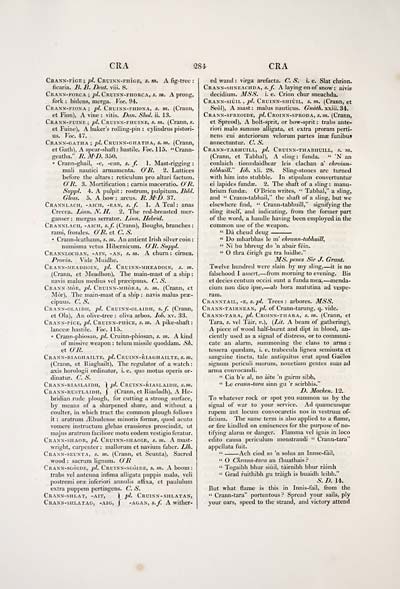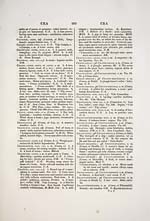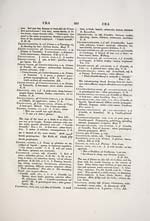Download files
Complete book:
Individual page:
Thumbnail gallery: Grid view | List view

CRA i
Cbann-fìge ; pi. Cruinn-fhìge, s. m. A fig-tree :
ficaria. B. B. Deut. viii. 8.
Crann-forca ; pi. Cruinn-fhorca, s. tn. A prong,
fork : bidens, merga. Voc. 94.
Crann-fiona ; pi. Cruinn-fhiona, s. m. (Crann,
et Fion), A vine : vitis. Da7i. Slid. u. 13.
Crann-fuine ; pi. Cruinn-fhuine, s. m. (Crann, s.
et Fuine), A baker's rolling-pin : cylindrus pistori-
us. Voc. 47.
Ckann-gatha ; pi. Cruinn-ghatha, s.m. (Crann,
et Gath), A spear-shaft : hastile. Voc. 1 15. " Crann-
geatha." R. M'B. 350.
• Crann-ghail, -e, -ean, s. f. 1. Mast-rigging :
mali nautici armamenta. O'R. 2. Lattices
before the altars : reticulum pro altari factum.
OR. 3. Mortification : carnis maceratio. OR.
Suppl. 4. A pulpit : rostrum, pulpitum. Bill.
Gloss. 5. A bow : arcus. R. MD. 37.
Crannlach, -aicii, -ean, s.f. 1. A Teal: anas
Crecca. LÌ7in. N. H. 2. The red-breasted mer-
ganser : mergus serrator. Linn. Hebrid.
Crannlach, -aich, s.f. (Crann), Boughs, branches:
rami, frondes. OR. et C. S.
• Crann-Ieathann, s. m. An antient Irish silver coin :
numisma vetus Hibernicum. O'R. Suppl.
Crannlochan, -ain, -an, s. m. A churn : cimea.
Pravin. Vide Muidhe.
Crann-meadhoin, jil. Cruinn-mheadoin, s. in.
(Crann, et Meadhon), The main-mast of a ship :
navis malus medius vel praecipuus. C. S.
Crann MÒR, ja/. Cruinn-mhòra, j(. m. (Crann, et
Mòr), The main-mast of a ship : navis malus prae-
cipuus. C. S.
Crann-olaidh, pi. Cruinn-olaidh, s./. (Crann,
et Ola), An olive-tree : oliva arbos. lob. xv. 33.
Crann-pìce, pi. Cruinn-phìce, *. m. A pike-shaft :
lanceae hastile. Voc. 115.
• Crann-phiosan, pi. Cruinn-phiosan, s. m. A kind
of missive weapon : telum missile quoddam. Sh.
et OR.
Crann-riaghailte, pi. Cruinn-riaghailte, s. m.
(Crann, et Riaghailt), The regulator of a watch :
axis horologii ordinator, i. e. quo motus operis or-
dinatur. C. S.
Crann-riaslaidh, \pl. Cruinn-riaslaidh, s.m.
Crann-rustlaidh, / (Crann, et Riasladh), A He-
bridian rude plough, for cutting a strong surface,
by means of a sliarpened share, and without a
coulter, in which tract the common plough follows
it : aratrura iEbudense minoris formae, quod acuto
vomere instructum glebas crassiores proscindit, ut
majus aratrum faciliore motu eodem vestigio feratur.
Crann-shaor, pi. Cruinn-shaoir, s. m. A mast-
wright, carpenter : mallorum et navium faber. Llfi.
Crann-seunta, 5. m. (Crann, et Seunta), Sacred
wood : sacrum lignum. O'R
Crann-sgòide, pi. Cruinn-sgòide, s. m. A boom:
trabs vel antenna infima alligata puppis malo, veli
postremi oras inferiori annulis affixa, et paululum
extra puppem pertingens. C. S.
CUANN-SHLAT, -AIT, | pi. CrUINN- SHLATAN,
Crann-shlatag, -aig, / -agan, s.f. A wither-
A> CRA
ed wand : virga arefacta. C. S. i. e. Slat chrion.
Crann-shneachda, s./. A laying on of snow : nivis
decidium. MSS. i. e. Crion chur sneachda.
Crann-siùil , pi. Cruinn-shiùil, s. m. (Crann, et
Seòl), A mast : malus nauticus. Gnàth. xxiii. 34.
Crann-spreoide, j9/.Croinn-sproda, *.»!. (Crann,
et Spreod), A bolt-sprit, or bow-sprit : trabs ante-
riori malo sumnio alligata, et extra proram perti-
nens cui anteriorum velorum partes imae funibus
annectuntur. C. S.
Crann-tabhuill, pi. Cruinn-thabhuill, s. m.
(Crann, et Tabhal), A sling: funda. " 'N an
conlaich tionndaidhear leis clachan a' chroinn-
tabhuilL" lob. xli. 28. Sling-stones are turned
with him into stubble. In stipulam convertuntur
ei lapides funds. 2. The shaft of a sling : manu-
brium fundae. O'Brien writes, " Tabhal," a sling,
and " Crann-tabhail," the shaft of a sling, but we
elsewhere find, " Crann-tabhuill," signifying the
sling itself, and indicating, from the former part
of the word, a handle having been employed in the
common use of the weapon.
" Da cheud deug
" Do mharbhas le m' chrann-tahhuill,
" Ni bu bhreug do 'n abair fein.
" O thra eirigh gu tra luidhe."
MS. penes Sir J. Grant.
Twelve hundred were slain b}' my sling, — it is no
falsehood I assert, — from morning to evening. Bis
et decies centum occisi sunt a funda mea, — menda-
cium non dico ipse, — ab hora matutina ad vespe-
Cranntail, -E, s. /)/. Trees: arbores. MSS.
Crann-taibnean, pi. of Crann-tarung, q. vide.
Crann-tara, pi. Cboinn-thara, i. m. (Crann, et
Tara, s. vel Tàir, v.), (Lit. A beam of gathering),
A piece of wood half-burnt and dipt in blood, an-
ciently used as a signal of distress, or to communi-
cate an alarm, summoning the clans to arms :
tessera quaedam, i. e. trabecula lignea semiusta et
sanguine tincta, tale antiquitus erat apud Gaelos
sigDum periculi suorum, nonetiam gentes suas ad
" Cia b'e al, i
ngu r
tsibh,
ùrbhis.'
D. Macken. 12.
To whatever rock or spot you summon us by the
signal of war to your service. Ad quamcunque
rupem aut locum convocaretis nos in vestruui of-
ficium. The same term is also applied to a flame,
or fire kindled on eminences for the purpose of no-
tifying alarm or danger. Flamma vel ignis in loco
edito causa periculum monstrandi " Crann-tara"
appellata fuit.
" Ach ciod so 'n solus an Innse-fàil,
" O Chrann-tara an fhuathais ?
" Togaibh bhur siùil, tàirnibh bhur ràimh
" Grad ruithibh gu tràigh is buaidh leibh."
S. D. 14.
But what flame is this in Innis-fail, from the
" Crann-tara" portentous ? Spread your sails, ply
your oars, speed to the strand, and victory attend
Cbann-fìge ; pi. Cruinn-fhìge, s. m. A fig-tree :
ficaria. B. B. Deut. viii. 8.
Crann-forca ; pi. Cruinn-fhorca, s. tn. A prong,
fork : bidens, merga. Voc. 94.
Crann-fiona ; pi. Cruinn-fhiona, s. m. (Crann,
et Fion), A vine : vitis. Da7i. Slid. u. 13.
Crann-fuine ; pi. Cruinn-fhuine, s. m. (Crann, s.
et Fuine), A baker's rolling-pin : cylindrus pistori-
us. Voc. 47.
Ckann-gatha ; pi. Cruinn-ghatha, s.m. (Crann,
et Gath), A spear-shaft : hastile. Voc. 1 15. " Crann-
geatha." R. M'B. 350.
• Crann-ghail, -e, -ean, s. f. 1. Mast-rigging :
mali nautici armamenta. O'R. 2. Lattices
before the altars : reticulum pro altari factum.
OR. 3. Mortification : carnis maceratio. OR.
Suppl. 4. A pulpit : rostrum, pulpitum. Bill.
Gloss. 5. A bow : arcus. R. MD. 37.
Crannlach, -aicii, -ean, s.f. 1. A Teal: anas
Crecca. LÌ7in. N. H. 2. The red-breasted mer-
ganser : mergus serrator. Linn. Hebrid.
Crannlach, -aich, s.f. (Crann), Boughs, branches:
rami, frondes. OR. et C. S.
• Crann-Ieathann, s. m. An antient Irish silver coin :
numisma vetus Hibernicum. O'R. Suppl.
Crannlochan, -ain, -an, s. m. A churn : cimea.
Pravin. Vide Muidhe.
Crann-meadhoin, jil. Cruinn-mheadoin, s. in.
(Crann, et Meadhon), The main-mast of a ship :
navis malus medius vel praecipuus. C. S.
Crann MÒR, ja/. Cruinn-mhòra, j(. m. (Crann, et
Mòr), The main-mast of a ship : navis malus prae-
cipuus. C. S.
Crann-olaidh, pi. Cruinn-olaidh, s./. (Crann,
et Ola), An olive-tree : oliva arbos. lob. xv. 33.
Crann-pìce, pi. Cruinn-phìce, *. m. A pike-shaft :
lanceae hastile. Voc. 115.
• Crann-phiosan, pi. Cruinn-phiosan, s. m. A kind
of missive weapon : telum missile quoddam. Sh.
et OR.
Crann-riaghailte, pi. Cruinn-riaghailte, s. m.
(Crann, et Riaghailt), The regulator of a watch :
axis horologii ordinator, i. e. quo motus operis or-
dinatur. C. S.
Crann-riaslaidh, \pl. Cruinn-riaslaidh, s.m.
Crann-rustlaidh, / (Crann, et Riasladh), A He-
bridian rude plough, for cutting a strong surface,
by means of a sliarpened share, and without a
coulter, in which tract the common plough follows
it : aratrura iEbudense minoris formae, quod acuto
vomere instructum glebas crassiores proscindit, ut
majus aratrum faciliore motu eodem vestigio feratur.
Crann-shaor, pi. Cruinn-shaoir, s. m. A mast-
wright, carpenter : mallorum et navium faber. Llfi.
Crann-seunta, 5. m. (Crann, et Seunta), Sacred
wood : sacrum lignum. O'R
Crann-sgòide, pi. Cruinn-sgòide, s. m. A boom:
trabs vel antenna infima alligata puppis malo, veli
postremi oras inferiori annulis affixa, et paululum
extra puppem pertingens. C. S.
CUANN-SHLAT, -AIT, | pi. CrUINN- SHLATAN,
Crann-shlatag, -aig, / -agan, s.f. A wither-
A> CRA
ed wand : virga arefacta. C. S. i. e. Slat chrion.
Crann-shneachda, s./. A laying on of snow : nivis
decidium. MSS. i. e. Crion chur sneachda.
Crann-siùil , pi. Cruinn-shiùil, s. m. (Crann, et
Seòl), A mast : malus nauticus. Gnàth. xxiii. 34.
Crann-spreoide, j9/.Croinn-sproda, *.»!. (Crann,
et Spreod), A bolt-sprit, or bow-sprit : trabs ante-
riori malo sumnio alligata, et extra proram perti-
nens cui anteriorum velorum partes imae funibus
annectuntur. C. S.
Crann-tabhuill, pi. Cruinn-thabhuill, s. m.
(Crann, et Tabhal), A sling: funda. " 'N an
conlaich tionndaidhear leis clachan a' chroinn-
tabhuilL" lob. xli. 28. Sling-stones are turned
with him into stubble. In stipulam convertuntur
ei lapides funds. 2. The shaft of a sling : manu-
brium fundae. O'Brien writes, " Tabhal," a sling,
and " Crann-tabhail," the shaft of a sling, but we
elsewhere find, " Crann-tabhuill," signifying the
sling itself, and indicating, from the former part
of the word, a handle having been employed in the
common use of the weapon.
" Da cheud deug
" Do mharbhas le m' chrann-tahhuill,
" Ni bu bhreug do 'n abair fein.
" O thra eirigh gu tra luidhe."
MS. penes Sir J. Grant.
Twelve hundred were slain b}' my sling, — it is no
falsehood I assert, — from morning to evening. Bis
et decies centum occisi sunt a funda mea, — menda-
cium non dico ipse, — ab hora matutina ad vespe-
Cranntail, -E, s. /)/. Trees: arbores. MSS.
Crann-taibnean, pi. of Crann-tarung, q. vide.
Crann-tara, pi. Cboinn-thara, i. m. (Crann, et
Tara, s. vel Tàir, v.), (Lit. A beam of gathering),
A piece of wood half-burnt and dipt in blood, an-
ciently used as a signal of distress, or to communi-
cate an alarm, summoning the clans to arms :
tessera quaedam, i. e. trabecula lignea semiusta et
sanguine tincta, tale antiquitus erat apud Gaelos
sigDum periculi suorum, nonetiam gentes suas ad
" Cia b'e al, i
ngu r
tsibh,
ùrbhis.'
D. Macken. 12.
To whatever rock or spot you summon us by the
signal of war to your service. Ad quamcunque
rupem aut locum convocaretis nos in vestruui of-
ficium. The same term is also applied to a flame,
or fire kindled on eminences for the purpose of no-
tifying alarm or danger. Flamma vel ignis in loco
edito causa periculum monstrandi " Crann-tara"
appellata fuit.
" Ach ciod so 'n solus an Innse-fàil,
" O Chrann-tara an fhuathais ?
" Togaibh bhur siùil, tàirnibh bhur ràimh
" Grad ruithibh gu tràigh is buaidh leibh."
S. D. 14.
But what flame is this in Innis-fail, from the
" Crann-tara" portentous ? Spread your sails, ply
your oars, speed to the strand, and victory attend
Set display mode to: Large image | Transcription
Images and transcriptions on this page, including medium image downloads, may be used under the Creative Commons Attribution 4.0 International Licence unless otherwise stated. ![]()
| Early Gaelic Book Collections > Blair Collection > Dictionarium scoto-celticum > Volume I > (354) |
|---|
| Permanent URL | https://digital.nls.uk/76579471 |
|---|
| Description | Lacks half title page in Volume 1. |
|---|---|
| Attribution and copyright: |
|
| Description | A selection of books from a collection of more than 500 titles, mostly on religious and literary topics. Also includes some material dealing with other Celtic languages and societies. Collection created towards the end of the 19th century by Lady Evelyn Stewart Murray. |
|---|
| Description | Selected items from five 'Special and Named Printed Collections'. Includes books in Gaelic and other Celtic languages, works about the Gaels, their languages, literature, culture and history. |
|---|

